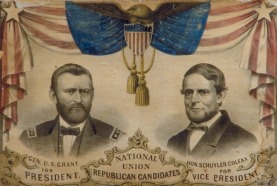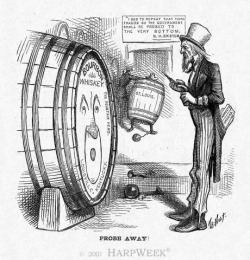The Life & Times of Ulysses S. Grant
Grant the Rock Star

URL too long to cite; citation on Citations tab
Grant was pressured in 1868 by Radical Republicans to run for the presidency. Grant had never held an elected office before, but they hoped that between his Civil War fame and public gossip about his rocky relations with the new President Johnson, he could win a victory for the party. Grant faced no major competition, revceived the Republican nomination easily, and won the general election in an electoral landslide. At the time, he was the youngest president ever---he was 46 years old.
Grant shepherded the reunited nation through Reconstruction. He granted amnesty to former Confederates, believing that they must offer forgiveness if the nation was ever to be whole again. Grant signed the Amnesty Act of 1872 to help this goal along. He dealt with keeping together a North that was tired after a long war effort against the South, and was now expected to rejoin with them. Grant also stationed troops in the South and kept the region under Republican, Northern governors---to keep the KKK in line and protect newly freed African-Americans, while trying not to insult or anger the Southern population.
Although Grant's presidency would come to be remembered for its scandals alone, Grant had a rather respectable record on civil rights. He signed bills to extend and protect voting rights, especially for African-Americans, and to prosecute KKK leaders. Grant guided the 15th amendment, giving freed male slaves the right to vote, and passed the Ku Klux Klan Act, which allowed federal intervention in breaking up "night riders." When militaristic groups like the Red Shirts and White League tried to suppress black votes and get rid of Republican governors by force, Grant signed the first ever civil rights act freom Congress---the Civil Rights Act of 1875, meant to provide equality in public sevices. Grant also nobly crusaded for Native Americans in a time when the genocide of their people was considered a non-issue, or even morally right. He fought to keep tribes' lands under their control, and to preserve native lands from the takeover of westward expansion.
Soon into Grant's second term, a worldwide depression called the Panic of 1873 hit the world markets. Spreading from the Austrian stock market, it soon engulfed the world, including the U.S. Its U.S. causes were many and varied, most stemming from poor economic and stock practices begun in the Civil War; its effects were just as diverse, with almost a quarter of all railroad companies going bankrupt. Unemployment was 14%, businesses were ruined, and wages dropped by 25%. Grant knew next to nothing about finance, and relied on those in his administration who did. He was paralyzed by the Panic, however, and did nothing to prevent it; he reacted slowly after it had gone into full effect, and what little he did wasn't very useful. The Panic of 1873 was not the shining moment in Grant's presidency. However, his veto in 1874 of a bill that would release huge amounts of currency into the nation did manage to curb inflation for years to come, a bright spot in the overall failure of Grant's response to the Panic.
The 18th presidency of the United States is perhaps best known for its skillful and important foreign policy, specifically in the Treaty of Washington in 1871. A dispute had arisen between the U.S. and the United Kingdom over Confederate ships CSS Florida, CSS Alabama, and CSS Shenandoah, which were produced in Britain and caused much damage to U.S. shipping in the Civil War. There were calls in the Senate for immediate reparations from the U.K. , and the matter may have led to war. Grant stepped in, however, and arranged the Treaty of Washington, which ended with $15, 500, 000 in reparations for the U.S. , settled disputes between the U.K. , Canada, and the U.S. , and called for Britain to claim regret for the destruction that the ships had caused---but not fault, which may have also led to war. This treaty was a landmark, and set a precedent not only in the U.S. , but around the world, that arbitration and diplomacy could often settle issues instead of going to war.
Unfortunately, Grant's presidency was marred by scandal. He often picked military friends over skilled politicians for administration appointments, and when subordinates often turned out corrupt, he failed to discipline them accordingly. Grant himself gave liberally to family members with federal funds, and often favored family and friends instead of people with proper political merit. Although this was the extent of Grant's personal shortcomings, his subordinates often engaged in less-than-legal practices. The largest of these was the infamous Whiskey Ring, in which high-up Republicans secretly stole millions of dollars in federal liquor taxes. When the scandal came out, even though Grant was not directly involved, it hurt his and his party's reputation greatly.
Grant shepherded the reunited nation through Reconstruction. He granted amnesty to former Confederates, believing that they must offer forgiveness if the nation was ever to be whole again. Grant signed the Amnesty Act of 1872 to help this goal along. He dealt with keeping together a North that was tired after a long war effort against the South, and was now expected to rejoin with them. Grant also stationed troops in the South and kept the region under Republican, Northern governors---to keep the KKK in line and protect newly freed African-Americans, while trying not to insult or anger the Southern population.
Although Grant's presidency would come to be remembered for its scandals alone, Grant had a rather respectable record on civil rights. He signed bills to extend and protect voting rights, especially for African-Americans, and to prosecute KKK leaders. Grant guided the 15th amendment, giving freed male slaves the right to vote, and passed the Ku Klux Klan Act, which allowed federal intervention in breaking up "night riders." When militaristic groups like the Red Shirts and White League tried to suppress black votes and get rid of Republican governors by force, Grant signed the first ever civil rights act freom Congress---the Civil Rights Act of 1875, meant to provide equality in public sevices. Grant also nobly crusaded for Native Americans in a time when the genocide of their people was considered a non-issue, or even morally right. He fought to keep tribes' lands under their control, and to preserve native lands from the takeover of westward expansion.
Soon into Grant's second term, a worldwide depression called the Panic of 1873 hit the world markets. Spreading from the Austrian stock market, it soon engulfed the world, including the U.S. Its U.S. causes were many and varied, most stemming from poor economic and stock practices begun in the Civil War; its effects were just as diverse, with almost a quarter of all railroad companies going bankrupt. Unemployment was 14%, businesses were ruined, and wages dropped by 25%. Grant knew next to nothing about finance, and relied on those in his administration who did. He was paralyzed by the Panic, however, and did nothing to prevent it; he reacted slowly after it had gone into full effect, and what little he did wasn't very useful. The Panic of 1873 was not the shining moment in Grant's presidency. However, his veto in 1874 of a bill that would release huge amounts of currency into the nation did manage to curb inflation for years to come, a bright spot in the overall failure of Grant's response to the Panic.
The 18th presidency of the United States is perhaps best known for its skillful and important foreign policy, specifically in the Treaty of Washington in 1871. A dispute had arisen between the U.S. and the United Kingdom over Confederate ships CSS Florida, CSS Alabama, and CSS Shenandoah, which were produced in Britain and caused much damage to U.S. shipping in the Civil War. There were calls in the Senate for immediate reparations from the U.K. , and the matter may have led to war. Grant stepped in, however, and arranged the Treaty of Washington, which ended with $15, 500, 000 in reparations for the U.S. , settled disputes between the U.K. , Canada, and the U.S. , and called for Britain to claim regret for the destruction that the ships had caused---but not fault, which may have also led to war. This treaty was a landmark, and set a precedent not only in the U.S. , but around the world, that arbitration and diplomacy could often settle issues instead of going to war.
Unfortunately, Grant's presidency was marred by scandal. He often picked military friends over skilled politicians for administration appointments, and when subordinates often turned out corrupt, he failed to discipline them accordingly. Grant himself gave liberally to family members with federal funds, and often favored family and friends instead of people with proper political merit. Although this was the extent of Grant's personal shortcomings, his subordinates often engaged in less-than-legal practices. The largest of these was the infamous Whiskey Ring, in which high-up Republicans secretly stole millions of dollars in federal liquor taxes. When the scandal came out, even though Grant was not directly involved, it hurt his and his party's reputation greatly.

